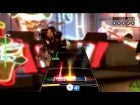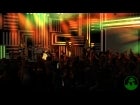(Editor's Note: for expanded coverage of Rock Band, check out our special monster-sized review as well as our Rock Band launch section.)
Is Rock Band the best game of 2007? If not, there's still a good chance it could be the biggest, as it brings music to the masses in a way we've never seen before, videogame or otherwise.
Developed by Harmonix, the company responsible for creating the Guitar Hero and Karaoke Revolution franchises, Rock Band allows you to live out your rock star fantasies by playing as a four-piece band -- guitar, bass, drums and vocals -- with a soundtrack of some of the most well-recognized rock songs of the past 40 years. Easy enough for almost anyone to pick up but loaded with enough depth to keep experts playing for months, it won't be long before Rock Band is the game everyone's talking about.
Rock Band could best be described as "band karaoke." Instead of having just a singer sing along with the music, Rock Band introduces other musicians to the fray. If you've played Guitar Hero, you'll immediately grasp the guitar and bass sections, as you attempt to strum along with notes as they descend down the screen. The drum tracks work similarly, with a new drum controller that consists of four electronic pads and a kick pedal. (Rock Band currently sells as a special $170 bundle that includes the game, a guitar controller, a drum controller and a USB microphone.)
The new Rock Band guitar controller is a small-scale model of a black-and-white Fender Stratocaster, and looks a lot more like a serious instrument than the SG and Xplorer models that shipped with earlier Guitar Hero games. It's got a few cool new features, such as a pickup switch that tweaks the sound of your guitar and extra fret buttons at the top of the neck that can be used for solos.
While the new Strat is a decent controller that should satisfy casual players, experts will likely get frustrated with the extra-wide fret buttons and squishy strum bar, which add some difficulty to tougher solos. The good news is that the Xbox 360 version of Rock Band is compatible with both the older Xplorer and new Les Paul controllers that ship with Guitar Hero III, so if you're the type of person who'll get bent out of shape over the Strat, there's a good chance you already have the guitars to replace it.
The new drum controller is a solid piece of hardware that should stand up to a beating, which is a good thing because you'll probably feel compelled to beat it a lot. It ships in several pieces but can be assembled pretty quickly, with clasps that allow you to adjust the height of the kit and gamepad buttons on the center to allow for easier menu navigation. The pads are more rigid than standard drums, which can take some getting used to if you play real drums; otherwise, the toughest challenge is getting coordinated with the kick pedal and getting a feel for hitting the pads, which are a relatively small target compared to real drums. (A pair of wooden Ludwig drumsticks are included with the package.)
The last piece of hardware in the bundle is a USB microphone (the Xbox 360 version includes a small powered USB hub for you to plug everything into). The mic sounds pretty decent, but has no actual controls on it; you'll need to connect a gamepad to navigate the vocal menus. If you're overly self-conscious about your singing, you can use the gamepad to adjust the relative volume of both the game vocals and your own on the fly.
Once you've gotten all the hardware together, there's a ton of gameplay in Rock Band. There are three solo campaigns for the guitar, drums and vocals, consisting of nine tiers of five songs each, increasing in difficulty as you go along. Overall, the guitar tracks are slightly easier than the Guitar Hero games: part of it is the actual song selections, which shy away from shredfests in favor of more mainstream songs; part of it is that the note charts are just friendlier, particularly avoiding piling on the three-note chords the way Guitar Hero III does.





 Outstanding!
Outstanding!


